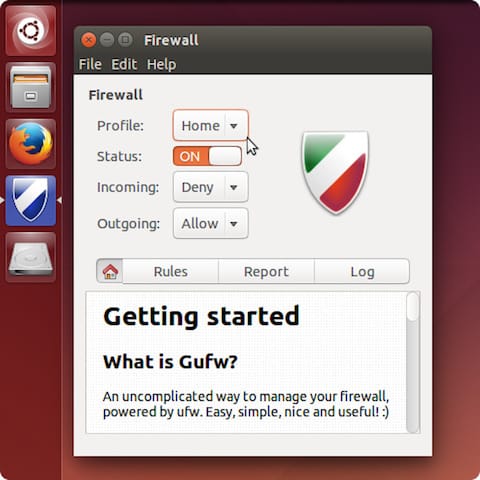How To Install Gufw on Ubuntu 22.04 LTS

In this tutorial, we will show you how to install Gufw on Ubuntu 22.04 LTS. Gufw, short for Graphical User Interface for the Uncomplicated Firewall, is a user-friendly front-end tool for configuring UFW (Uncomplicated Firewall), which is the default firewall management tool for Ubuntu. Gufw simplifies the process of setting up and managing firewall rules, making it accessible for users with varying levels of expertise.
Advantages of Using Gufw:
- Simplicity: Gufw offers an intuitive interface that streamlines the firewall configuration process.
- Visualization: It provides an easy-to-understand graphical representation of your firewall rules.
- Rule Management: Gufw enables you to create, edit, and delete firewall rules effortlessly.
- Application Profiling: You can set up rules for specific applications, improving security and control.
- Security Monitoring: Gufw offers logging and monitoring capabilities for an in-depth view of your firewall activity.
This article assumes you have at least basic knowledge of Linux, know how to use the shell, and most importantly, you host your site on your own VPS. The installation is quite simple and assumes you are running in the root account, if not you may need to add ‘sudo‘ to the commands to get root privileges. I will show you the step-by-step installation of the Gufw on Ubuntu 22.04. You can follow the same instructions for Ubuntu 22.04 and any other Debian-based distribution like Linux Mint, Elementary OS, Pop!_OS, and more as well.
Prerequisites
- A server running one of the following operating systems: Ubuntu 22.04, 20.04, and any other Debian-based distribution like Linux Mint.
- It’s recommended that you use a fresh OS install to prevent any potential issues.
- SSH access to the server (or just open Terminal if you’re on a desktop).
- An active internet connection. You’ll need an internet connection to download the necessary packages and dependencies for Gufw.
- A
non-root sudo useror access to theroot user. We recommend acting as anon-root sudo user, however, as you can harm your system if you’re not careful when acting as the root.
Install Gufw on Ubuntu 22.04 LTS Jammy Jellyfish
Step 1. Keeping your system up-to-date is crucial for security and compatibility. Open your terminal and run these commands:
sudo apt update sudo apt upgrade
Step 2. Installing Gufw on Ubuntu 22.04.
To install Gufw, we’ll use the APT package manager, a trusted method for package installation. With the repository updated, you can now install Gufw:
sudo apt install gufw
During the installation, Ubuntu will prompt you to confirm. Type ‘y‘ and press Enter.
Step 3. Launching Gufw on Ubuntu.
You can start Gufw directly from the terminal by typing:
gufw
Alternatively, you can find Gufw in the applications menu. Search for ‘Firewall Configuration’ or ‘Gufw,’ and click on the icon to open it.

The Gufw interface is divided into sections for incoming and outgoing rules. Here’s a brief overview:
- Status: This section allows you to enable or disable the firewall.
- Incoming: Here, you can set rules for incoming connections.
- Outgoing: Configure outgoing connection rules.
- Application Profiles: Manage and configure application-specific rules.
Congratulations! You have successfully installed Gufw. Thanks for using this tutorial for installing Gufw on the Ubuntu system. For additional help or useful information, we recommend you check the official Gufw website.